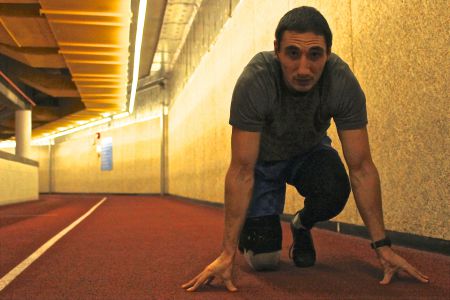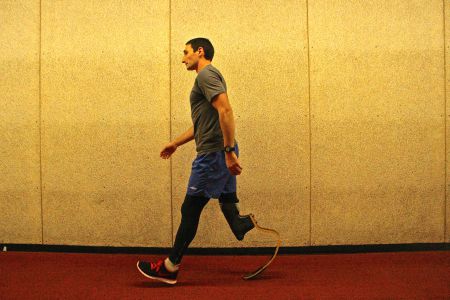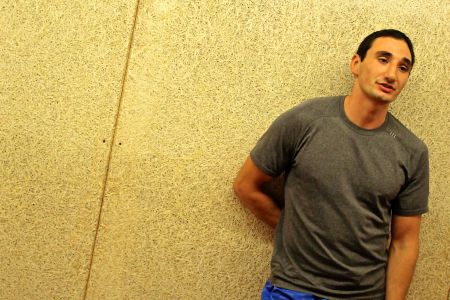K'JIPUKTUK (Halifax) - Despite being the second-largest sporting event in the modern world, the Paralympic Games—the premier tournament for athletes with physical disabilities—rarely garner the same hype and hullabaloo as their able-bodied counterpart.
When the 2014 Winter Olympics in Sochi, Russia, wind down in late February, the same level of buzz is unlikely to continue into March, when the Paralympics are scheduled to begin.
“It’s (a) lack of structure and lack of awareness around the legitimacy of the sport,” said David Greig, a Canadian veteran of the Paralympic movement and former national coach with Athletics Canada, about the underdog status of the Paralympics and Para-athletics in general.
“I think that’s the biggest thing.”
According to Greig, Para-sports are overshadowed in part because of the absence of a mainstream support system for encouraging and investing in disabled athletes similar to the one available to able-bodied athletes.
Supportive, performance-oriented media and good promotion of quality athletes with disabilities are also key to moving the yardstick forward, he said.
“You’re empowering people with disabilities, but you’re also witnessing some pretty cool high-performance human beings,” said Greig.
Compared to the modern version of the Olympic Games, which began in Greece in 1896, the Paralympic Games are relatively young, having made their summer debut in 1960 in Rome. Ornskoldsvik, Sweden, hosted the first Paralympic Winter Games sixteen years later.
For Greig, part of the challenge today is normalizing Paralympic athletics in the mainstream.
He listed off what he believes is necessary: access to equipment, training opportunities, quality programming and coaching, good facilities and long-term, lifetime opportunities for engagement in sport.
The view from the frontline
Shelburne County, N.S. native Jackie Marciano is living the Para-athletic experience first-hand.
Currently the top-ranked single amputee 400-metre sprinter in Canada, the Halifax-based 24-year-old is training toward the 2016 Paralympic Games in Rio de Janeiro, Brazil.
“The able-bodied Olympics does get more attention and media coverage directed towards them,” said Marciano. “But as Para-athletes you just kind of have to go out and get your own money.”
Marciano—who lost his right leg below the knee playing on rail tracks as a nine-year-old boy—was recruited when Paralympic developing coach Ueli Alberts spotted him out for a jog in Wolfville, N.S.
“Jackie really didn’t know there was sporting opportunities for him,” said Greig, who worked with Marciano throughout the young athlete’s career. “(He) was literally … running down the side of the road.”
Nearly four years later, and after narrowly missing the team headed for the London Olympics in 2012, Marciano has his eyes set on Rio.
His Canadian record-setting time for the 400-metre race is 52.22 seconds. That is fewer than three seconds behind world record holder for the single amputee 400-metre sprint event, American David Price, who ran a 49.87-second race in 2013.
Marciano worked with prosthetists at Dalhousie University to help design the special carbon-fibre prosthetic he wears to train.
“It’s (about) pushing the devices to their limits,” said Marciano, likening the process to developing able-bodied sporting equipment such as better skis or a faster bobsled.
“Doing that you’re really just pushing yourself as hard as you can.”
“I’m pretty proud of Jackie,” said Greig.
“He’s focusing his attention and energy into not only improving himself as an athlete but also promoting the sport which is just hugely admirable.”
“Shitty things happen to these people and they’re trying to make the most of it,” said Marciano.
But in some senses, it’s the general public that has the catching up to do.
“Those people don’t care,” Marciano said about Para-athletes. “They’re just like, ‘This is sweet. Let’s go out and do this. Let’s go do what we can actually do.’
“I think the general public is seeing that and jumping on with that idea.”
People are caring less and less about all the little problems, added Marciano.
In that sense, the Paralympics play an important role in normalizing sports that don’t fit into the able-bodied mainstream. They force the general public to confront pre-conceptions about the perceived limitations of disability.
Like the Olympics for the able-bodied, the Paralympics can inspire people with physical disabilities to engage in athletics, illustrating through example that a healthy, lifelong relationships with sport is possible, whether for a high-calibre competitor or an everyday athlete.
“Let’s take this to a new level,” said Marciano. “Let’s make people feel whole again.”
The future of the Paralympics
As for the Paralympic movement today: “It’s growing,” said Greig.
“I think with all the scandals and issues with the Olympics and disruptions and those kinds of things … people (and) sponsors are starting really to look at … the Paralympic movement.”
As an athlete, Marciano said he is also optimistic for the future of the Paralympic Games.
“When people think of the Olympics they think of the best athletes—completely functional able-bodied athletes—competing against each other,” said Marciano.
According to Marciano, the Paralympics take a same-but-different approach, combining even more science and technology with biology and athleticism.
“I think it’s honestly going to surpass the Olympics,” he said.
“I always like to say I’m living history as it happens,” he added. “It’s going to be wild.”





